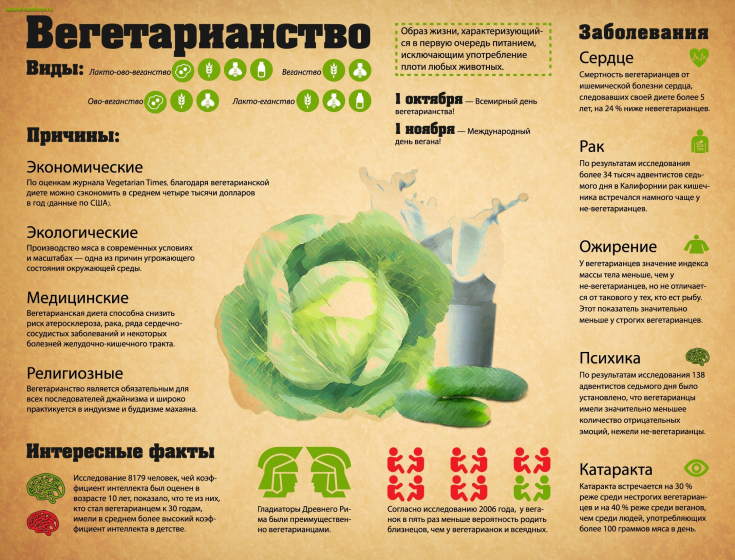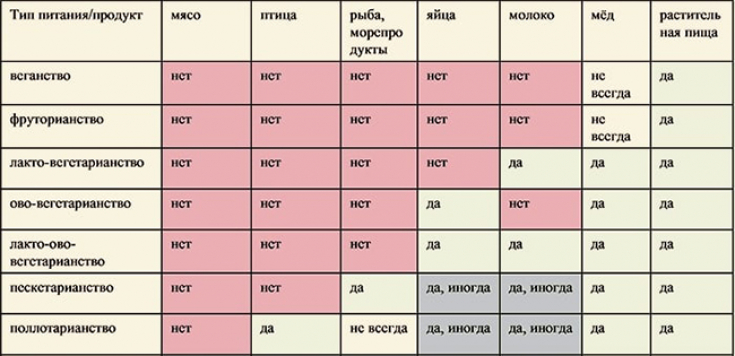In the last decades, there has been a steady trend towards humanization of nutrition: people are increasingly refusing meat for ethical reasons and to improve health. The most popular power systems — veganism and vegetarianism. Not everyone understands the difference between the two, and this is a problem, since it is difficult to create a balanced diet without understanding the pros and cons of diets. Let's take a look at the specifics of a vegetarian lifestyle and look at it from a health point of view.
- How Giving Up Meat Affects Human Health
- Veganism and vegetarianism: what is the difference between food systems
- Features of veganism as a way of life and nutrition
- Highlights on vegetarian and vegan food systems
How giving up meat affects human health
Let's start with the main thing: without meat, you can make a perfectly balanced diet without damaging your health. It is important not to rush to extremes. If you give up meat and competently think over your menu, then will only benefit:
Follow us on Instagram
-
Slimming. By removing meat from your diet and replacing it with vegetables, you reduce the calorie content of meals. Weight loss will happen automatically.
-
Cholesterol reduction. By giving up meat products, you take care of the heart and vessels.
-
Reduce "odor" sweat. When meat is digested, toxins are formed in the body, which are excreted with sweat. It is they who give it an unpleasant smell.
-
Reducing the risk of getting cancer. WHO recognizes red meat as a carcinogen.
-
Healthy skin.Many skin problems — the result of dysfunction of the digestive system. By enriching the diet with fiber, you solve them.
-
Economy. Meat — expensive product. By choosing a vegetarian diet, you reduce the cost of your food.
There are many pluses, but there are pitfalls.
Meat — a reliable source of B vitamins and vitamin D, phosphorus, potassium, zinc, iodine, iron. All these substances are also contained in products of plant origin, but absorbed from them worse.

Information for thinking. Did you know that approximately one in seven people on the planet does not eat meat? About 1 & nbsp; billion people adhere to vegetarian diets. human. And in some countries, vegetarianism is considered more "normal" than meat-eating. For example, in India, about 70% of the population — vegetarians. By the way, our Orthodox believers who observe fasts refuse meat products 178-212 days in year (depending on Pascha day).
Read also: Vegetarianism — the modern path to health: looking at popular types
Veganism and vegetarianism: what is the difference between food systems
Vegan — This is one of the varieties of vegetarianism. There are lax food systems that exclude meat, but allow dairy products, and some even eggs and fish.
Veganism is a diet that completely excludes animal products, which can really be unhealthy.
Vegetarian nutrition has been known for a long time. It was also mentioned by the Pythagoreans, who did not eat meat for ethical reasons. All other products are allowed. And believing Hindus have been eating the same way for many centuries. The vegan system appeared more than half a century ago, and the controversy around it still continues.
Let's deal with vegetarian systems:
-
Ovolacto-vegetarianism. Everything is allowed except meat and fish. A typical diet includes grains, fruits, vegetables, eggs, nuts, mushrooms, seeds, milk, and cheese.
-
Lacto-vegetarianism. Meat, fish, eggs are prohibited. Everything else is allowed, and dairy products are welcome. Hindus, Buddhists, Jains have been adhering to this system of nutrition for centuries.
-
Ovo-vegetarianism. You can eat everything except meat, fish, dairy products. A plant-based diet is supplemented with eggs.
-
Veganism. The food system is completely free of products of animal origin: meat, fish, milk, eggs, honey. You can only eat plant foods.
There are also offshoots from the listed systems. For example, there is pescatarianism, which excludes the consumption of meat, eggs and milk, but allows fish and seafood.

Every person who refuses meat products can find a suitable nutrition system. With lactose intolerance, you can stop at ovo-vegetarianism. People who consider eggs as future birds can choose the time-tested lacto-vegetarian system.
Read also: Vegetarianism, veganism and raw food: what is the difference
Features of veganism as a way of life and nutrition
Veganism and vegetarianism are similar only at first glance. These systems are fundamentally different.
While vegetarianism is a non-killing of animals, veganism is based on absolute non-harm, and this concept is considered very broadly.
Vegans are banned from seafood, eggs, milk, bee products. Do not eat prepared foods that contain them, for example, egg-based noodles, baked goods with honey and butter, dishes with gelatin and lecithin. Many sauces, beer, jellies also fall under the ban. You have to carefully choose the menu so that it is healthy and vegan.
The diet of vegans is rich in fiber, which has a positive effect on peristalsis and intestinal microflora. Plant phytoncides perfectly fight pathogenic bacteria, suppress putrefactive processes in the intestines. Strict vegans rarely have kidney and gallstones, hypertension, diabetes, cardiovascular disease.
For all the advantages of strict veganism, doctors and dietists are against this system:
-
Doctors Remind About Essential Amino Acid, Vitamin & Micronutrient Deficiencies Vegans Face. They insist that many substances are poorly absorbed from plant foods, so it is advisable to take additional multivitamin complexes. But and they are not a panacea.
- Nutriticians stress that plant foods do not satisfy hunger for long.
A person has to eat often. This does not affect the figure, because. all products are low-calorie, but the digestive system works in a mode of constant overload. Heat treatment of plant foods improves the situation, but does not completely solve the problem.
Vegans refuse not only animal products, but clothing with fur, leather, wool. They don go to circuses and zoos, refusing exploitation of animals. A high degree of mindfulness is important in the transition to such a lifestyle.
Read also:7 best protein sources for vegetarians The main thing about vegetarian and vegan nutrition systems
Vegetarian — a reliable food system with long traditions.His opponents, who believe that in a harsh climate it is impossible without meat and fat, it is worth remembering fasting believers, whose diet is closer to vegetarianism (and in long strict fasts to veganism) than to meat-eating, because there are more than 200 fast days a year.
Vegan — ambiguous system for several reasons:
- There are health benefits: clear skin, normal bowel function, low incidence of diabetes, cardiovascular disease.
-
-
-
-
Telegram Rejection of meat is not harmful. It can provide health benefits. What is really harmful — rejection of sanity. When choosing a nutrition system, do not get excited and change your lifestyle gradually, carefully listening to the reactions of the body. Do not forbid yourself all food of animal origin at once, because there are a lot of useful substances in honey, dairy products and eggs. Give your body time to adapt to the changes.
Read also:Plant milk: can replace cow's milk
You may be interested: Just 3 minutes a day for a perfect face. Gymnastics is suitable for everyone and does not take much time.






Add a comment